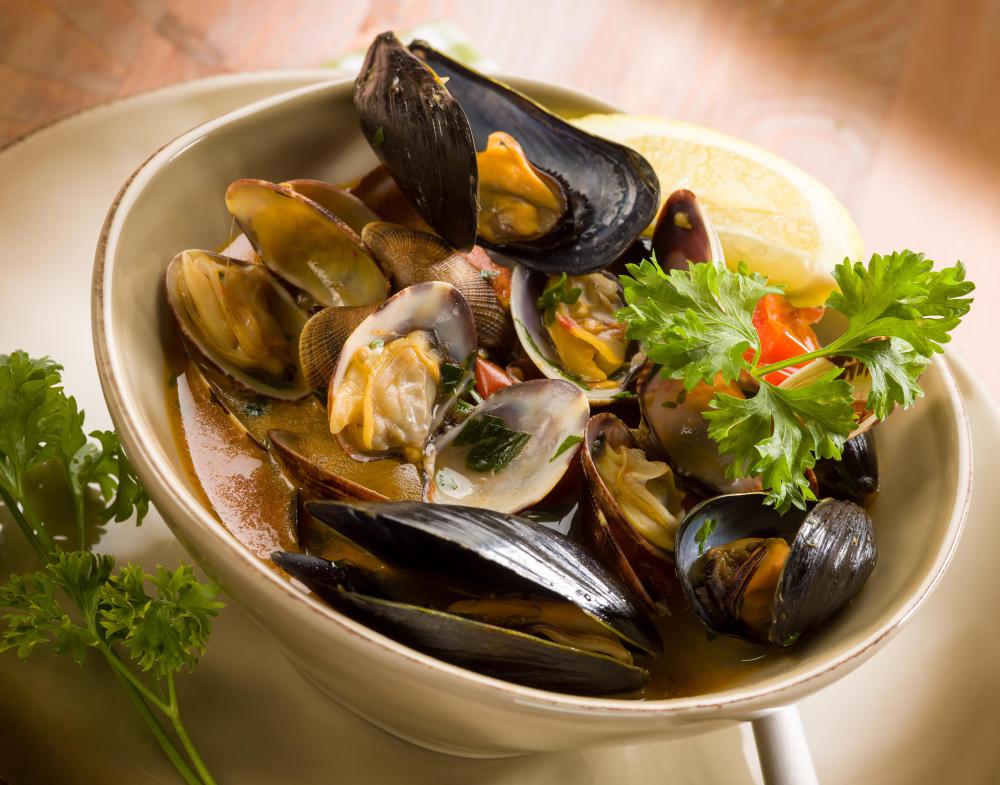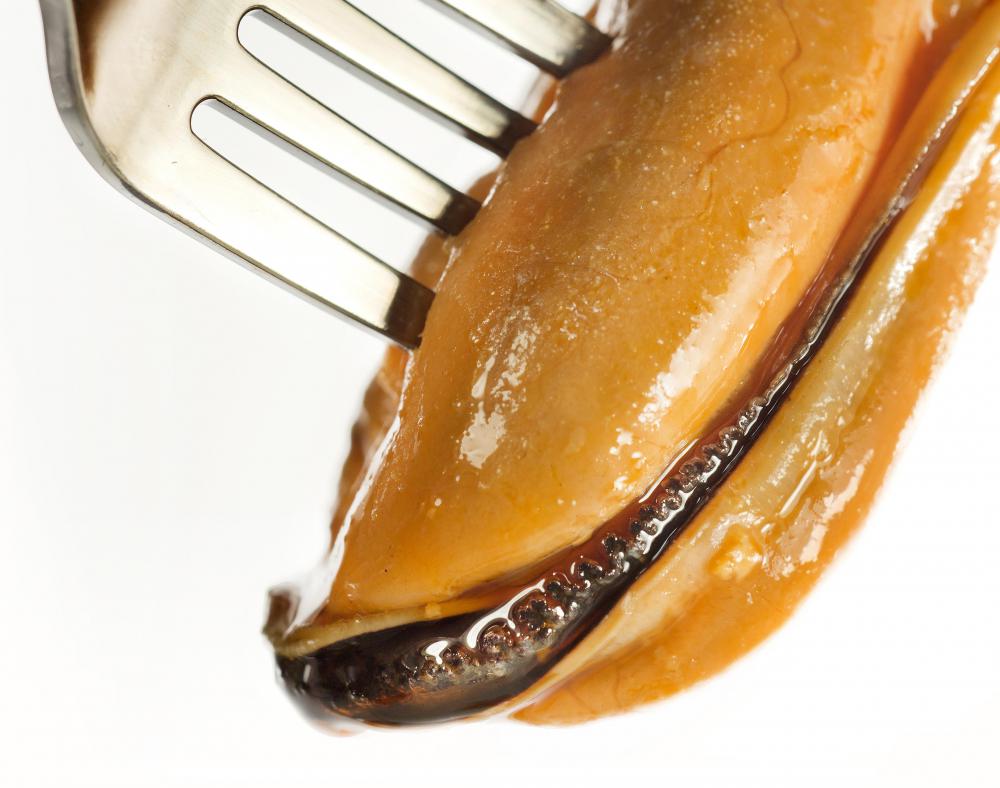At AllThingsNature, we're committed to delivering accurate, trustworthy information. Our expert-authored content is rigorously fact-checked and sourced from credible authorities. Discover how we uphold the highest standards in providing you with reliable knowledge.
What is a Mussel?
A mussel is a type of bivalve mollusk that can be found in fresh water lakes, streams, and creeks, along with the salty intertidal zone where oceans meet the shore. Like many other shellfish, they are cultivated and caught in the wild to serve as food for humans, and they also have a number of predators in the natural environment. This mollusk is also much more popular in Europe and parts of the Asia than North America, where only a small portion of the population is interested in mussels as a food source.
Mussels share many characteristics with clams, another bivalve widely eaten by humans. They have a more oblong than oval shell, however, with the dorsal region located towards the bottom of the shells rather than in the middle, as is common with clams. Mussels typically have a dark shell, in blue, green, or brown, and they come in a range of sizes. In freshwater, they typically burrow into the bottom of a body of water, allowing harvesters to dig them up relatively easily. An intertidal mussel anchors itself to a rock with a thick cluster of very strong fibers that can be difficult to dislodge.

These mollusks reproduce sexually, with the young hatching loose in the water. The larvae float until they reach a suitable living space, which distributes them more widely and gives them a better chance at survival. The primary diet of a mussel is plankton, microscopic one-celled organisms which float freely in salt and fresh water. Along with other shellfish, mussels are filter feeders, sucking in water and nutrients to eat.

Because of the way they eat, mussels can also collect toxins such as those contained in a red tide. For this reason, it is dangerous to harvest them at certain times of the year, and any potential harvester should always check on ocean conditions before collecting and eating them. Assuming that they are safe to eat, mussels are more tender and flavorful when they are small, and they should also be cooked while they are still alive. A living one will generally tightly clamp its shell shut, so if it has an open shell, the cook should tap it gently to see if it snaps shut, indicating that it is alive and good to eat.
The flesh is slightly sweet, and they can be very tender if they are well cooked. Popular preparations include steaming, smoking, and cooking in soups and sauces. The cuisine of many European coastal regions incorporates these mollusks, which are also canned for export elsewhere.
Frequently Asked Questions
What exactly is a mussel?
A mussel is a type of bivalve mollusk that lives in both freshwater and marine environments. They have two hinged shells and are known for their ability to filter water, which helps maintain aquatic ecosystems. Mussels are also a source of food for various predators, including humans, and are cultivated for this purpose in aquaculture.
How do mussels contribute to their ecosystem?
Mussels play a crucial role in their ecosystems by filtering and purifying water, which helps to control algae and maintain water clarity. According to the U.S. Geological Survey, a single freshwater mussel can filter up to 15 gallons of water per day, significantly impacting water quality and providing a healthier habitat for other aquatic life.
What do mussels eat?
Mussels are filter feeders, meaning they consume small particles of organic matter suspended in the water. They primarily eat plankton, algae, and detritus. By filtering these particles, mussels not only nourish themselves but also help to keep the water clean and clear for other organisms.
How do mussels reproduce?
Mussels have a unique reproductive process. In freshwater species, the males release sperm into the water, which is then drawn in by the females. The females fertilize their eggs internally and release larvae called glochidia. These glochidia must attach to a fish's gills or fins to develop before dropping off to grow into adult mussels.
Are mussels endangered?
Many mussel species are considered endangered or threatened, primarily due to habitat destruction, pollution, and the introduction of invasive species. Conservation efforts are in place to protect these vital organisms. The International Union for Conservation of Nature (IUCN) has listed numerous mussel species as vulnerable or endangered, highlighting the need for continued conservation work.
Can you eat all types of mussels?
While many mussels are edible, it's important to consume only those that are safe and harvested from clean waters. Marine mussels are commonly eaten, but some freshwater mussels may accumulate toxins and pollutants, making them unsafe. Always ensure mussels are sourced from reputable suppliers and are fully cooked to avoid health risks.
AS FEATURED ON:
AS FEATURED ON:












Discussion Comments
@cardsfan27 - Oh my, we have zebra mussel problems where I live, too. I don't think there is any way to get rid of them, either.
When I was a kid, I remember my friends and siblings would always go down to the lake and collect mussels for dinner. It was always a ton of fun. We got to play in the water and didn't get in trouble! Besides that, it was fun making the mussels close their shells and collecting the different types.
Now, if you go to that same lake, you can't find anything but zebra mussels. They have completely pushed out the blue mussels and things that were there.
@ddljohn - I have had mussels from a local river, and they were all right. It was a pretty clean river, though. I can't blame you for worrying about their quality.
The thing we have to worry about where I live is something called a zebra mussel. They are an invasive exotic type of mussel that are taking over everything. Most mussels are pretty good to have around. Like the article says, they filter out contaminates from the water and are a food source for things like otters.
Zebra mussels, though, attack everything. They attach themselves to the bottoms of boats and displace native mussels. We started finding them a few years ago on our boat, and they are terrible. They aren't worth eating, either.
@TreeMan - Now that I think about it, I don't know that I have very many recipes that just use mussels. It seems like combining mussels with other seafood is much more common than eating them alone. Maybe that is because mussels can be kind of bland like others have mentioned.
My favorite dish is something called cioppino. Basically, it is a seafood medley. You can put pretty much anything into it depending on what is in season or what you can afford. My grandmother who grew up in Massachusetts used to make it all the time. If I make it, I usually add in mussels, shrimp, and crab legs. The seasoning I use just depends on how I'm feeling. Obviously, garlic, butter, pepper are always a good start. I usually add some dill, basil, and coriander, too. And don't forget the lemon at the end!
@ankara - I have never heard of mussel dolma. It sounds like it would be pretty good. I have never thought of combining rice with mussels.
I tried cooking them one time, but like you said, you have to add in a lot of stuff to give them a good taste. Otherwise, they just kind of taste like oysters, and I am not a fan of that taste.
Does anyone know of any other good mussel recipes? Even if you know of good ways to season plain mussels, I would be interested in hearing about that, as well. I just never know what to get for them when I'm thinking of buying mussels.
I don't know about eating mussels but I have used them to filter my aquarium tank in the past. I got several green mussels from a lake and since mussels pick up toxins I thought it might be a good natural filter for my tank.
It seemed to work fine for a while but then they died and I didn't even notice. So they ended up contaminating my tank and I had to get rid of them. Snails are much better natural filters, I wouldn't recommend using mussels to anyone if you're thinking about it.
@ankara-- I don't like mussels. I live by a lake and we do have mussels here but I've noticed that the mussels cluster around areas that are not the cleanest. I almost feel like mussels like dirty water, I guess they feed on the toxins there. I'm afraid I will get sick if I eat those although I have seen neighbors eat them.
I'd rather get pre-cleaned frozen mussels from the store. But I'm not a huge fan anyway and they're quite expensive. I'd rather have salmon or shrimp.
I love mussels. Aside from fish, they're my favorite type of seafood. But I like mussels that grew in salt water and not fresh water mussels because I think those taste better.
I can have mussels prepared any way. Recently I had some at a restaurant where they were cooked in a butter broth. They were amazing! I've also had a very unique dish called mussel dolma. It's basically cooked mussels stuffed with white rice and spices. You eat them with lemon juice. They're amazing but it's so hard to find them.
I've never tried cooking mussels though. I know they cook really fast but they also lack flavor alone. So it needs to be made with broths, herbs and spices and I haven't attempted any recipes yet.
Post your comments